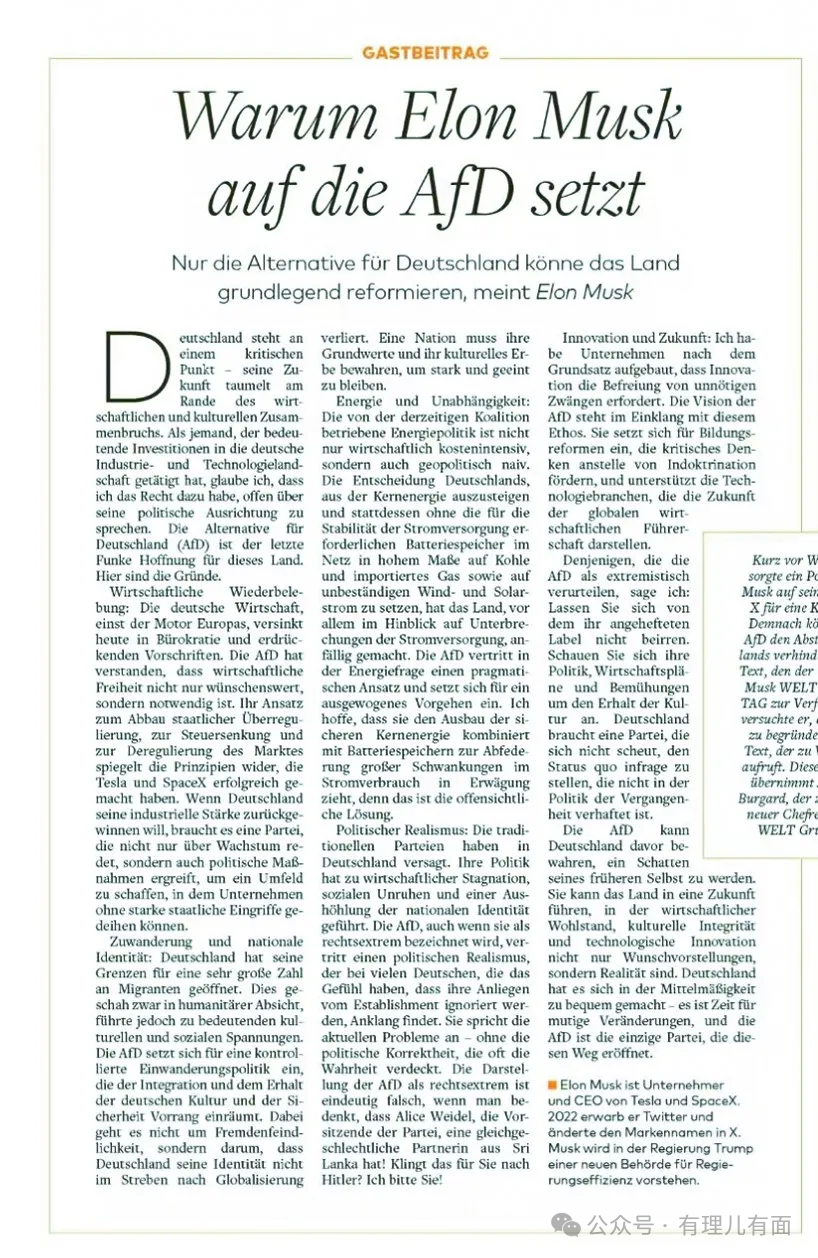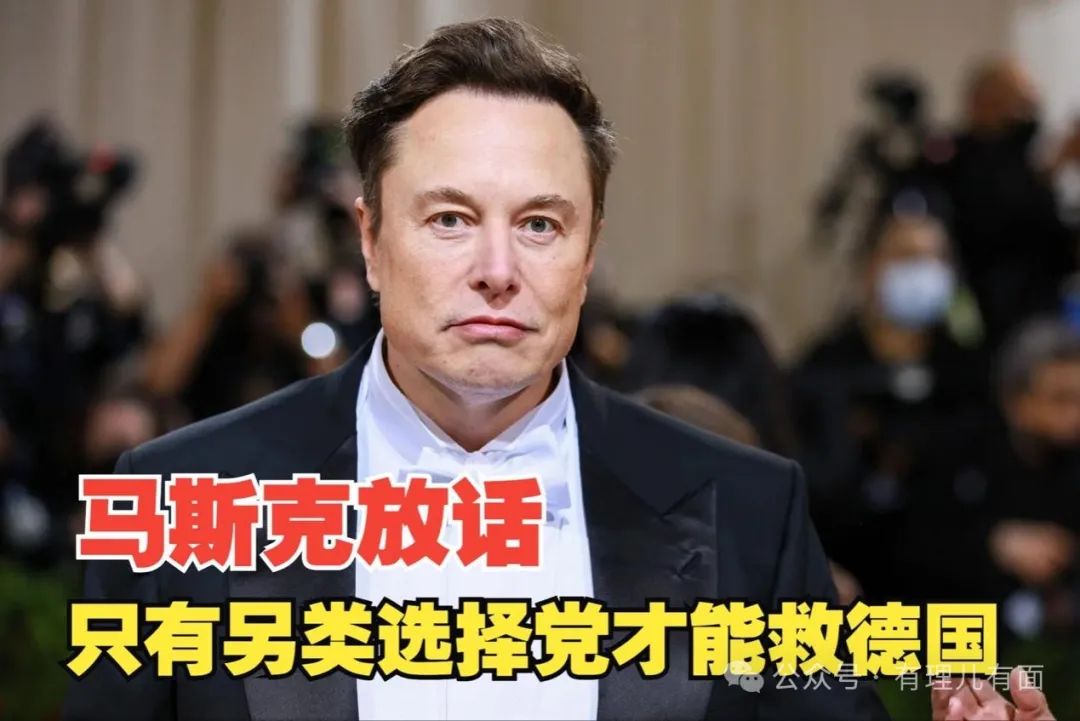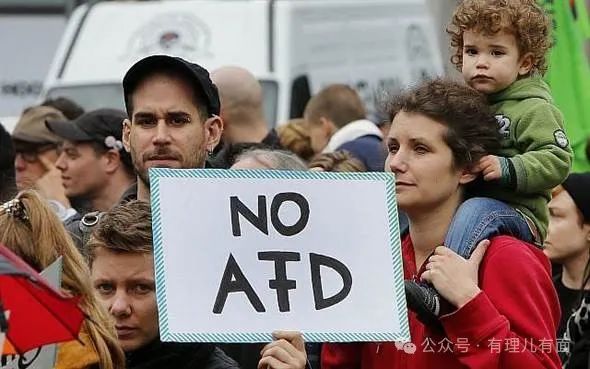Ever since Donald Trump’s election, Elon Musk has been on social media nonstop, commenting on this, criticizing that, and attracting global attention.
But on December 29th the German political establishment, reviled by Musk, could not resist a counterattack, calling his comments”Megalomaniac”.
The trigger was Elon Musk’s announcement on social media on December 20th that “Only the afd can save Germany”, which he had previously described as a platform for the right-wing party, it made Germany very unhappy.
Then, on December 29th, Elon Musk published an opinion piece in the leading German newspaper, Die Welt am Sonntag, reaffirmed his firm support for the far-right German party, the afd. With only seven weeks to go before the Bundestag of Germany election, Elon Musk has thrown a grenade into German politics.

In it, Musk begins by asserting his right to speak openly about German politics, citing major investments in German industry and technology.
Elon Musk’s argument focuses on the following points. The first was to sound the alarm that Germany was on the”Precipice of economic and cultural collapse”.
He championed the afd and even saw it as Germany’s“Last resort”, believing it was the only party that could save the country from economic and cultural collapse. He also stressed that only the afd was serious about deregulation, and that this did not conflict with some EU guidelines. Elon Musk also praised the party’s commitment to preserving German cultural identity in the face of the onslaught of globalisation and open borders, only when a country protects its basic values and cultural heritage can it have strength and unity.
On energy policy, Musk questioned Germany. The German decision to phase out nuclear power over 12 years because of Chernobyl and Fukushima nuclear accident was seen by Musk as a fool’s errand that left the German economy vulnerable to electricity problems. But official statistics show the situation is not as bad as he says. Elon Musk also asserted that the German political system was “Intellectually bankrupt”, claiming that “Current German policies have brought the economy to a standstill, society to a standstill, and even national identity to a close”, the AFD, on the other hand, is open to the unwelcome truth. In his view, Germany, once known for its rigor and self-discipline, is now mired in a bureaucratic mess that takes”Political correctness” so seriously that it conceals the truth, the voice of the people was also ignored.

Finally, Elon Musk notes, opting for a party in power would remove the “Hard stuff” from German education and focus instead on fostering critical thinking and independent thinking in children. In some ways, perhaps Elon Musk has a point. For example, he says that”Germany has become accustomed to mediocrity”, a sentiment shared by many influential unions and business leaders frustrated by broad labour protection. In recent years, industrial giants such as Volkswagen, ThyssenKrupp and BASF have announced layoffs and plant closures. Add to that the fact that the country is now trying to wean itself off Russian gas and the economy is in even worse shape, with some even calling it a “Sick man of Europe Country”. German manufacturing orders have fallen and the index of industrial production has fluctuated, all of which are a visual reflection of the country’s economic woes. Yet Elon Musk’s bet on the afd to solve the country’s problems is patently premature and one-sided. The AFD is not as positive as musk describes. The party is a far-right populist party, known for its extreme anti-immigration, anti-eu, anti-nato and other positions, and some of its members even have ties to extremist organizations such as neo-nazis, germany’s domestic intelligence agency has classified most of its members as extremists and monitors them.
Why did Elon Musk choose to support the afd at this critical juncture? There are undoubtedly complex motivations and considerations behind this. As a key adviser to president-elect Donald Trump, Elon Musk will play a key role in American politics for the next four years, and he has broad business interests in Germany, including Tesla’s factory near Berlin. Tesla’s performance in the German market has been closely watched as the world’s leading maker of electric cars. The AFD, on the other hand, advocates economic policies such as less over-regulation, lower taxes and higher Index of Economic Freedom rates, which would undoubtedly benefit companies such as Tesla. Therefore, musk supports the afd, mainly for the maintenance and pursuit of their own business interests. Musk’s comments also quickly triggered a backlash in German politics. Opponents of the afd have expressed strong anger and dissatisfaction with Musk’s remarks. They believe that musk, as a foreign billionaire, is trying to interfere in Germany’s political elections, is a serious threat to German democracy. ”

It is unacceptable for foreign billionaires to try to influence our political landscape and support parties that undermine our democratic values,” said Matias Scholtz, General Secretary of the German Social Democratic Party, while there is freedom of speech in Germany, this does not mean that it is free to say incorrect or irresponsible things in order to criticise musk for supporting the afd”Without good political advice”, and called on the public to remain rational and objective. Eva Marie Kogel, the editor-in-chief of the editorial page, resigned to express his dissatisfaction with the publication of Musk’s article. While the outgoing and incoming editors, Ulf Posart and Jan Philippe Bugard, defended the publication, saying that democracy and the press, based on freedom of speech, should accommodate different positions, but Burgard also made clear that Elon Musk’s view that only the afd could save Germany was “Fatally wrong”. Germany’s upcoming elections have been complicated and uncertain by Musk’s comments.
The dissolution of the German “Traffic Light” coalition has brought forward the election, according to a poll released on December 10 by the German public opinion research institute in Forsa, the traditional centre-right coalition party of the Christian Democratic Union and the Christian Social Union took the top spot, with 31 per cent, while the afd came in second with 18 per cent, support for the Social Democrats and Greens also picked up, at 17% and 13% respectively.
Despite the increase in support for the afd in Germany, due to the German electoral system, it is usually difficult for a single political party to obtain a majority of seats and a multi-party coalition is needed to form a cabinet, while the mainstream political parties in Germany have reached a consensus, the possibility of cooperation with the afd was firmly ruled out, which made it difficult for the afd to break through the political isolation and achieve its ruling goal in the short term, even with the support of Musk.
In the years since Donald Trump won the presidential election, Musk’s political ambitions have come to the fore not only in the US but also in the politics of many Western countries, thanks to the vast sums of money and cutting-edge technology at his disposal. Musk himself is not sure what effect this trend will have. However, one thing is certain, western politics is entering a new era of active intervention of science and technology oligarchs in politics, European politics will certainly be more lively in the future! Images from the network